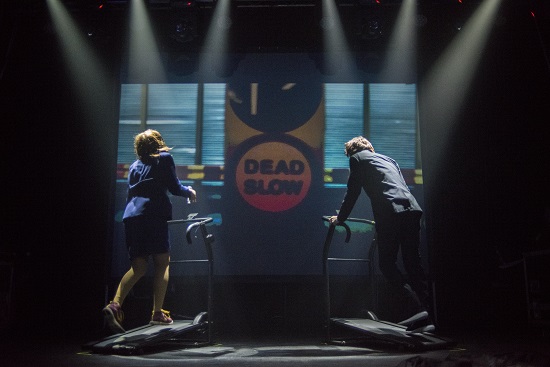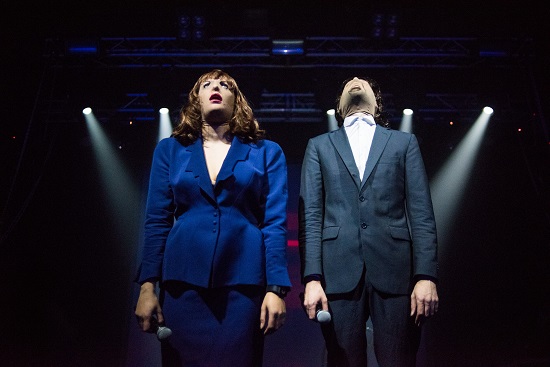Pictures of Gazelle Twin’s Kingdom Come live show by Earl Wan
Last Friday, Gazelle Twin surprise-released her new album Kingdom Come, studio recordings of the tracks performed at her current live installation shows of the same name.
The live show consists of two black treadmills facing a large screen which shows six films by Chris Turner and Tash Tung, while Natalie Sharp (aka Lone Taxidermist) and Stuart Warwick appear on stage dressed in in city workwear, trainers, flesh tights with mouth holes on their heads, wigs, and generic black raincoats.
The new LP, however, was recorded by the more traditional Gazelle Twin line-up. To find out more about why the album was released without fanfare, the differences between the live experience and the newly released recordings, her plans for the future and more, we caught up with Elizabeth Bernholz.
tQ: Why release the album as a ‘surprise’, without any fanfare?
Elizabeth Bernholz, Gazelle Twin: In the live sense, this music has been ‘out there’ for nearly 2 years now. It seemed like a good idea to let people just access it rather than spend ages planning or funding a big PR campaign. I should say that this release follows a really special Vinyl Factory release which happened earlier this year as part of the CTM Festival show in Berlin – they put out 3 tracks with really beautiful packaging designed by Jonathan Barnbrook, using stills and images by Chris Turner. It’s quite likely that’ll be the only physical version that will exist of this project… unless it hits the UK Top 40 by some bizarre turn of events.
How different is the experience for the listener of this recorded version of Kingdom Come to the live shows?
All the vocals on record are me at various pitches. For the live shows, we kept in some of my vocal as a kind of ‘narrator’, but the rest was reinterpreted incredibly by Natalie Sharp and Stuart Warwick, who give it a very different but wonderful edge, with loads of contrast and extreme wildness. Some of the music features fairly relentless repetitive, and extended instrumental passages as I’d written it with cinematic images and more installation/theatre performance spaces in mind, but there’s also a few “songs” in there like Cling Film, which might feel bit more familiar, to anyone who knows my previous releases. There’s no shortage in beats, but there’s possibly more harrowing underscore.
You’ve been performing the Kingdom Come For Two Vocalists regularly since it was first commissioned, at what point was the studio version recorded?
All the music was created before the first show at Future Everything in March 2016. I had to have everything finished so that Chris and Tash could also make the accompanying films which are all choreographed tightly, and then of course before enrolling two vocalists to learn it all.
What was the personell on the recorded version, did Natalie Sharp and Stuart Warwick have any input?
Jez, being my husband, is always involved in the writing process. He always provides the initial (usually critical) first feedback on everything I create, but in terms of interpreting the vocals for the live show, and also the choreography of the live show, Nat and Stu were heavily involved in devising that and have continued to perfect it without my presence, for nearly 2 years. They both have naturally strong personalities and voices and lots of creative ideas, in totally different ways, so they are integral to the show. It’s effectively my spawn – it has my DNA but it also has some free will. Jez, Nat and Stu bring it to life for every show whilst I stay home with the baby, watching from afar.

How do people respond to your Kingdom Come live shows (in a way you presume they wouldn’t if it was just you behind a mic and Jez behind a synth)?
I think since the Unflesh tour, the responses have been generally overwhelming. We’ve had disdain, confusion, total fear, total aggression and confrontation, and total joy and liberation. I loved being able to get in people’s faces in a way I would never do in day to day life, particularly towards men who like to square up to me because they couldn’t see a face looking back at them. There was something very simple about the production of the Unflesh tour that made it work in any venue, with any audience (and in the early days in Europe we played to some audiences of fewer than 10).
Without these elements, I can’t say it would have the same effect for performer-audience and audience-performer. Eye contact is a funny thing. It can provoke, it can cross a line, it can soften tension. I like to provoke, I like to lose myself completely and see an audience doing the same. I’m very sure that most people don’t have a problem doing this at gigs or in clubs, but I think a lot of the reason I prefer to perform in another skin is so that as a performer, I can feel stronger, I can leave myself behind and I can provide relevance and conviction about the content of my music – ultimately that drives everything. I’m not writing music to sound pretty, or lighten the burden, or give people a sense of joie de vivre. I’m writing about difficult stuff most of the time.
Why do you mask your identity on stage?
Anyone who sees or experiences the effect of wearing a mask will know how it feels. It’s like stepping out of yourself. Fun, power, mischief – and more, depending on how strong one’s urges are.
In the pre-costume days from about 2006 – 2010, I tried very hard to cut out various recognisable human identities for myself; playing-up to all the industry/social norms, panicking over what dress to wear for each gig, how to overcome this unshakable body dysmorphia or personality anxiety with my embarrassing goofy shyness. Then on one particularly self-loathing fuelled day I collapsed and thought, "What and who am I doing this for?”. All that time wasted, and none of it was related to the music itself, which wanted to encompass the universe. So I just gave myself a simple break. I decided to make sure that the perimeter of my body became a vessel for the themes behind the music, not the current state of fashion or the obligations I felt continually overshadowing my gender. When I took myself out of the equation completely and wore a costume for the first time on stage, I felt fearless. It quickly became an addiction and I have never looked back. Now, the more people question my "covering up" because they deem it as a ‘gimmick’ or some have even described it as ‘a shame’(!), the more I feel its burgeoning relevance in these times and the further I have to go with it.
Where do your influences come from – specifically when it comes to the live aspect of what you do?
Live performance as a representation of the music, and as the ‘voice’ of a record often doesn’t always seem to match up for me and I often feel a bit frustrated seeing live music – classical, rock, electronic, they all have their own issues. But I love it when something feels all-encompassing and when I can get totally immersed in another world. Very few influences on me come from music or live performance.
A continually long-lasting impression on me was Mike Nelson’s ‘Coral Reef’ exhibition at Tate Britain, and Gregor Schneider’s performance piece ‘Die Familie Schneider’ in Whitechapel. Both were completely different but they had a similar effect on the viewer who entered a space that messed so deeply with their perception of reality (and art) completely, that it was disturbing and dizzying. It became my goal to try to recreate that effect, but in a live performance.
What other artists do you admire who take a more performative, non-conventional approach to playing live?
In terms of the most intriguing combination of identity-play, provocation, and unconventional live show setup, it was the Dean Blunt project, which I never saw, I just heard stories about through mutual friends, promoters and a lot of YouTube videos. He seemed to be able to create a kind of legend that had people totally split down the middle; either smugly sure of what he was doing, or really angry because they didn’t. I heard of promoters who nearly had heart attacks because the show they thought they had booked turned out to be a powerpoint presentation, or something else totally different, and reports of whole audiences walking out etc. But with it there is always a brilliant simplicity. And humour. There’s no way in or out. There’s no one explanation. There’s no possible way to know what will follow. And musically it’s like a haunted TV, constantly switching channel, you never know what the next thing will be but it’ll probably make you feel weird. It’s certainly of our time
What are your plans for the future? Will you be continuing to perform Kingdom Come live
Initially I thought there would only ever be a handful of shows. I wrote it in late 2015 specifically for other performers, partly as an exercise in what would happen if I made something as a composer rather than performer, but also knowing that I would be pregnant and/or looking after a young baby once it was all finished and ready to tour. I was 7 months pregnant when it premiered, and my son is now 18 months old. The shows have kept on coming. It seems like it just has a life of its own, so, as long as people still want to go and experience it live, we’ll keep letting it happen I suppose.
I hope to release and tour another new album in 2018, but I think Kingdom Come has given me a real insight into the idea of writing for other performers, and what it means to create music under a set of concepts, rather than something based on one person’s performance identity, so it may well not be my last excursion into employing alternate performers, in fact I suspect it’s only the beginning.


